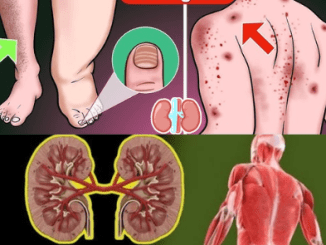Alzheimer’s disease, a relentless and devastating brain disorder, affects millions of people worldwide, yet its early symptoms often go unnoticed. A former neurologist, Dr. Daniel Gibbs, experienced this firsthand when he diagnosed himself with Alzheimer’s years before his official diagnosis. His story reveals a surprising, undetected warning sign everyone should be aware of—one that could pave the way for early intervention and better management of this condition.
The Silent Warning Sign: Loss of Smell
.jpg)
Dr. Gibbs’ journey began in 2006 when he noticed a subtle but persistent change: his sense of smell was fading. At the time, he was only 55 and otherwise healthy. Despite this, his extensive experience as a neurologist led him to suspect that this could be an early symptom of Alzheimer’s.
He explained that almost all individuals with Alzheimer’s experience some degree of smell impairment, though most remain unaware because the decline happens gradually. This revelation underscores the importance of paying attention to even minor sensory changes.
Connecting the Dots: Genetic Testing
Although he wasn’t displaying other common Alzheimer’s symptoms, Dr. Gibbs took a proactive step and referred himself for genetic testing. In 2012, his results revealed he carried two copies of the APOE4 allele, a gene variant significantly associated with Alzheimer’s disease.
Carrying one APOE4 gene can double or triple a person’s risk of developing Alzheimer’s, while two copies increase the risk twelvefold. However, it’s important to note that having this gene doesn’t guarantee the development of the disease. It’s a risk factor, not a certainty.
Three years later, Dr. Gibbs received an official Alzheimer’s diagnosis, confirming what he had suspected for nearly a decade.
Adapting to Life with Alzheimer’s
Since his diagnosis in 2015, Dr. Gibbs has embraced a proactive approach to managing the disease. He has implemented several lifestyle changes aimed at slowing its progression, including:
- Adopting the Mediterranean Diet: This diet emphasizes fresh vegetables, fruits (especially berries), whole grains, and lean proteins, while minimizing dairy and processed foods.
- Practicing Tai Chi: This gentle form of exercise helps improve balance, flexibility, and overall well-being.
- Eliminating Alcohol: Alcohol can exacerbate cognitive decline, so Dr. Gibbs chose to cut it out entirely.
These lifestyle adjustments reflect growing evidence that healthy habits can positively impact brain health, even in the face of Alzheimer’s.
Unexpected Advantages of Losing Smell
Surprisingly, Dr. Gibbs has found a silver lining in his loss of smell. He shared that he no longer gets disgusted easily, can handle unpleasant tasks like picking up after pets without issue, and no longer spends money on expensive wine since he can’t detect its aroma.
.jpg)
More significantly, he’s noticed a shift in his perspective. The loss of smell has made him a more tolerant and empathetic person. He now engages with individuals he might have overlooked in the past, such as striking up conversations with homeless individuals.
However, he admits that the loss isn’t without its downsides. He misses simple pleasures, like the smell of frying bacon, and food now tastes bland and indistinct.
Recognizing Other Early Symptoms of Alzheimer’s
While a declining sense of smell is a critical warning sign, it’s not the only early symptom of Alzheimer’s disease. Other signs to watch for include:
- Memory lapses: Forgetting recent events or conversations.
- Periods of confusion: Struggling to follow familiar routines or getting lost in known locations.
- Poor judgment: Making decisions that seem out of character or risky.
- Increased anxiety: Feeling unusually nervous or worried without a clear cause.
As the disease progresses, these symptoms can worsen, leading to more pronounced memory loss, disorientation, hallucinations, and even severe weight loss.
Why Early Detection Matters
.jpg)
Alzheimer’s disease is a progressive condition, meaning it worsens over time. However, early detection can make a significant difference in how it’s managed. Identifying symptoms early allows for timely medical intervention, lifestyle adjustments, and participation in clinical trials that could slow the disease’s progression.
Dr. Gibbs’ story is a testament to the power of awareness and proactivity. His ability to recognize an often-overlooked symptom and seek confirmation through genetic testing highlights the importance of staying informed about your health.
Taking Action: When to See a Doctor
If you notice changes in your memory, sense of smell, or cognitive abilities, don’t ignore them. While these changes might not necessarily indicate Alzheimer’s, it’s better to rule out potential causes with a healthcare professional.
Doctors can use a combination of cognitive tests, imaging scans, and genetic testing to assess your risk and provide guidance on next steps. The earlier you act, the more options you have to manage the condition effectively.
Conclusion
Dr. Daniel Gibbs’ journey with Alzheimer’s offers invaluable insights into the disease’s early warning signs, particularly the often-overlooked loss of smell. His story emphasizes the importance of paying attention to subtle changes in your body and taking proactive steps toward understanding your health risks.
By staying informed, adopting a healthy lifestyle, and seeking medical advice when needed, you can take control of your brain health and improve your quality of life, even in the face of a challenging diagnosis. Remember, it’s never too early—or too late—to prioritize your well-being.


